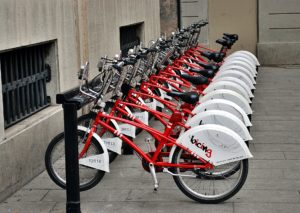By Sergiusz Prokurat
Source: Warsaw Business Journal, Number 36, March 2017
Instead of buying a car, you can borrow one from a neighbor. Instead of looking for a hotel in Warsaw, rent a room from a local. Instead of calling a taxi, get picked up by someone who has free space in their car. All this has never been so easy. Here comes the era of the sharing economy, which is not an insignificant piece of news, but a clear trend that is developing along with the mobile internet market and the increasing confidence of Polish society

The sharing economy consists of connecting people via Web platforms, allowing them to provide services or share their assets, resources, time, skills or capital without any transfer of property rights. The essence of this phenomenon is that private individuals can share their assets – real estate, vehicles, media content – to compete with traditional entrepreneurs. For example, in the US, users can rent cars from one another (Relayrides.com, Whipcar.com), share bicycles (Liquid.com), exchange things for a certain amount of time (SnapGoods.com and NeighborGoods.com), rent parking spaces (Parking Panda), take care of a pet in the absence of its owners (Dogvacay.com), or perform odd jobs (TaskRabbit.com). The craze associated with the sharing economy has now come to Poland. Poles acquire knowledge on Wikipedia, travel with BlaBlaCar and search for accommodation through couchsurfing.com. It is highly popular to rent urban bikes via Veturilo. Other solutions based on this model are co-working, consisting of a shared rental of an office, Parking Panda, which allows renting one’s own backyard as a parking place, iParkomat helps find parking places, Feastly is used for ordering shared meals, or Walutomat, where you can exchange currency. There is also a social currency exchange platform, Trejdoo; Give Your Box, a social delivery service; Wolneauto.pl, a platform for renting cars; Wymiennik, a social service allowing the exchange of goods, services or skills, where instead of money they use “alterkas,” a type of currency used to maintain balance between giving and taking.
All of these are the components of the sharing economy. Although the percentage of Poles who take advantage of what technology brings is slightly lower than the European average, it is still an increasingly popular phenomenon that has reached 20 percent of Polish internet users – as is shown by the “TNS Polska POLSKA.JEST.MOBI2015” report. The study conducted by the European Commission and TNS Poland proves it has already entered the lifestyles of 28 percent of the EU population and the sharing economy is identified as one of the most important trends in the development of services and mobile technologies. This is confirmed by the report entitled “(Współ)dziel i rządź!” [Share and conquer!], published in 2016 by PwC, which shows that approximately 40 percent of adult Poles have heard of sites where private individuals provide paid services, e.g. BlaBlaCar, Airbnb, Uber, JadeZabiore, or Polak Potrafi. No wonder that by 2025 the global value of this market may reach $335 billion. “I have noticed that people are now more keen to benefit from the sharing economy, because these are places where we can get what we are interested in through people-to-people cooperation and not in the form of a product or a service. I think it gives great opportunities. Just recently, via Jadezabiore, I sent a Christmas package to my mum, as the traditional post is congested again. If I go somewhere, it is faster and cheaper to use services such as Uber or BlaBlaCar,” said Aleksandra Jezierska, an enthusiast of new technologies, working in the IT Department at one of Warsaw’s banks.

The simplicity of the solution is that in most cases everything can be done directly with a mobile phone. The key aspect of the success of this idea is the development of the internet, especially its mobile solutions. An increasing number of internet users with different needs can easily find one another. Accessing the network with a mobile device allows one to communicate at any place or time and creates interesting opportunities.
According to the generally accepted definition, the sharing economy is focused mainly on warranting profits for both parties. The buying party will benefit from the offered service, e.g. inexpensive accommodation or package delivery. Firstly, according to the report of a research institute in Paris, IDDRI, it can save households 7 percent of their expenditure. Secondly, this model of earning is also an opportunity for service providers. “The sharing economy is a manifestation of ubiquitous digitization being of revolutionary importance. It is the initiation of the prosumer era – almost every consumer can become a producer by using commonly available platforms,” said Jan Fabisiak, SCCD think-tank expert. Transparency and confidence are in price. Therefore, the people responsible for managing platforms develop a system of reputation, in the form of a star rating and commenting system.

The models of the sharing economy gain popularity among consumers by precisely answering their key needs, which is particularly important for the young generation, i.e. the need for a low price, the need for personalization and the need for convenience. This is made possible thanks to an effective combination of resources (such as a car, apartment or skills) with the demand for such services. However, it is not that simple. Because it is one thing giving an occasional lift to random passengers, and another thing making money out of an all-year-round apartment rental. It is difficult to distinguish who is doing it on the principle of barter or community exchange of goods and who is doing it to make a profit.
In 2015 in Poland, huge controversies accompanied the arrival of the US-based Uber. The platform connects car drivers with people who want to use them as taxis. The company and the driver share the profits. In the US, Uber has proved to be competition for taxi drivers. In Poland the scale of the company’s operation is so far quite small but doubts are of similar pertinence, just as in the case of Airbnb. Taxi drivers do not like the fact that a private person can take customers, while they had to get a paid license. Taxi drivers have gone as far as attacking Uber drivers with paint. The issue of legal liability remains an open question.

Opponents of the sharing economy highlight that it is a sphere located somewhere between a scantly regulated activity and using private ownership and a strictly controlled service activity. As a consequence, in the case of Airbnb or Uber, it manifests itself as follows: these companies act as an intermediary for sharing private property – homes or cars – and make profit from it. While competing directly with hotels or taxis, they do not pay the same taxes (e.g. for employees) or insurance, and they do not need to comply with safety procedures. Many industries can feel the transformation and pressure made by the sharing economy, including the banking, hospitality and logistics sectors.
We do not always have to buy and own in order to use certain goods. Sometimes the best option is shared use. The sharing economy very often offers a more optimal use of resources, however, firms do not share their resources at all. When companies cease to be communities of users and transform into corporations, they become a threat for entrepreneurs subject to restrictions they do not have to comply with – which leads to unfair

competition and a reduced inflow to the National Treasury, because all the inflow goes where the company is registered. The problem has been spotted by Polish fiscal offices, which have identified Uber drivers and checked whether they have a registered business activity.
The sharing economy has many advantages, such as building social ties and trust between people. We sometimes, quite altruistically, hand over our time or money to someone we do not know – but whether it is safe or not to take a stranger in for a night or use Wikipedia, relying on the knowledge and earnestness of Wikipedians, depends on the honesty of other people. Poland has been waiting for such social innovation for too long.
Glossary:
- insignificant – nieistotny
- component – składnik
- congested – przeciążony
- to warrant – gwarantować
- expenditure – wydatki
- ubiquitous – wszechobecny
- random – przypadkowy
- to distinguish – rozróżnić
- pertinence – istotność, słuszność
- liability – odpowiedzialność
- scantly – niewystarczająco, ledwo
- to comply – przestrzegać
- to cease – zaprzestać
- earnestness – powaga












